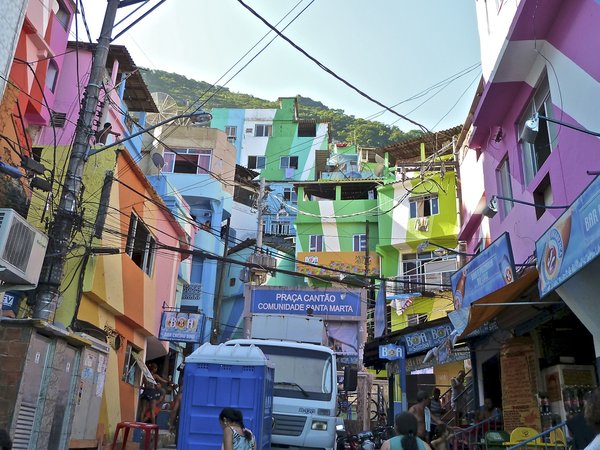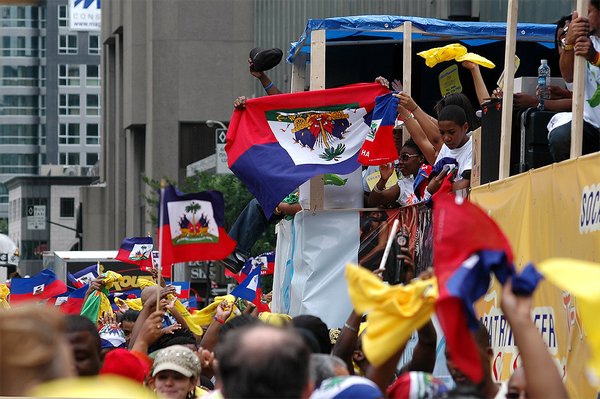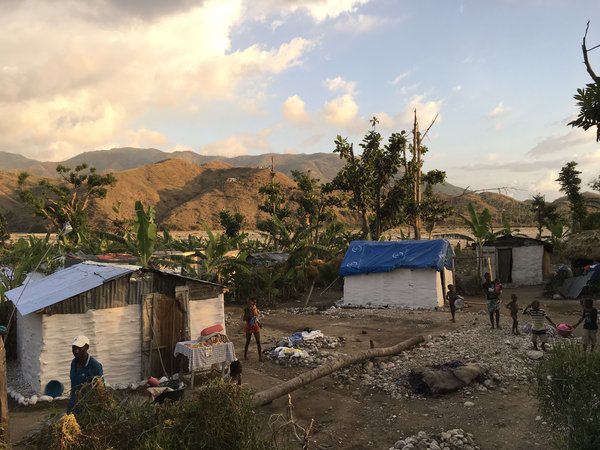
Haitian community members met in Rio de Janeiro for discussions on their experiences in Brazil. Photo credit Rah Bxd.
This blog was written by Daniel Martins, Jan Onoszko, Felipe Moulin and Jackson Schmiedek.
Background context
Decades of political, socioeconomic, food and educational insecurity and instability have shaped Haitian mobility in the Americas. This national context of crisis was deepened by the 2010 earthquake, which in turn led an influx of Haitian migrants to Brazil. It is in this scenario that IMJA (with its headquarters in Maré, a favela in the North Zone of Rio de Janeiro) opened its doors for a process of listening and sharing of the demands for fundamental rights not yet attained by the Haitian community in Brazil.
Creating space for community
In November 2022, IMJA held its first two meetings with leaders from the Haitian community, the MIDEQ Hub team, activists, researchers and representatives from civil society. Seventeen Haitian community leaders from Rio de Janeiro, São Paulo, Brasília, Curitiba, Maringá and Porto Velho gathered in person and online. Five Haitian organisations participated : UNIB — União dos Negros Imigrantes no Brasil (Union of Black Migrants in Brazil) —, Jeune Haiti, Associação União Faz a Força (Association Union Makes Strength), UCEPH — Unificação dos Estudantes (Students’ Unification), Profissionais e da Comunidade Haitiana no Exterior (Professors of the Haitian Community Abroad) and ADHIC — Associação pelos Direitos humanos do Imigrante Contemporâneo (Association for Contemporary Immigrant Human Rights ). The meetings were also joined by representatives of Brazilian civil society organisations, Vivo Rio and Cáritas.
The second meeting, "Access to rights for Haitians in Brazil", was held with Heaven Crawley, MIDEQ director and Head of Equitable Development and Migration at the United Nations University Centre for Policy Research. Heaven presented MIDEQ’s three main goals: to produce and share data and academic knowledge regarding South-South migration; to construct powerful narratives regarding migrants and migration; to engage in objective improvements in the quality of life for migrant communities.
The difficulty of reuniting families, the excessive and inept bureaucracy for obtaining visas and renewing passports, in addition to the difficulty to gain labour rights, are major challenges for the Haitian community in Brazil. In addition to the lack of legal guidance, Haitians cited difficulties to access professional qualification courses, obtaining certified translations of documentation, and the language barrier. They also noted the derogatory words used by Federal Police officers when they encounter Haitian migrants.
Creating these spaces for discussion between MIDEQ researchers and the Haitian community leaders helped foster discussions on solutions to the various challenges Haitians in Brazil face, including through the formation of associations. As Haitian migrant, Wilson Cenatus, from Curitiba in the south of Brazil, noted:
“Associations are fundamental for representing our collective voice towards achieving some objectives. They help to facilitate the construction of a social memory and of a space for debate within the community, engaging with the future of migrants and their descendants. It allows us to take part in the construction of public policies and legislative processes for migration; to monitor the definition and application of migration policies; to intervene together with public representatives in defending migrants’ interests; and to pressure the state into including migrants on their agenda.”
MIDEQ’s research in Brazil
IMJA, for its part, is not a traditional organisation. Based in Parque Maré, one of the 16 favelas that make up Maré, Rio de Janeiro North Zone, IMJA carries out its work under the premise that knowledge production is only meaningful if it incorporates Black people and those who are on the periphery. This commitment was affirmed by the organisation when it embarked on the MIDEQ project in Brazil. The survey and the quantitative research was carried out by Haitian researchers in the states of Rio de Janeiro, São Paulo, Parana, Santa Catarina and Rondonia.
According to Jailson de Souza e Silva, MIDEQ Brazil’s Co-Investigator, IMJA proposes a movement that collaborates with associations that advance the struggle for rights. Together with organisations like Viva Rio and Cáritas, IMJA aims to influence different sectors to work towards guaranteeing rights of the Haitian community in Brazil.
As Jailson noted during our discussions, "the Rights Agenda for the Haitian community is a construction that involves changing narratives about Haitians as well as overturning this [Brazil’s] media representation. It defends that not just the French, but the Haitian Revolution represents a much greater racial and republican milestone for Brazilians."
Given that Haitian organisations work locally, they often do not have political strength to advance with their agenda. Thus, the meetings aimed to strengthen community leaders and associations in order to foster mechanisms for putting together a common agenda of rights. The agenda allows Haitian associations, with the support of civil society organisations, to defend their legitimacy and advocate for their rights in the legislative and executive branches. The most urgent and sensitive demands for families to be reunited point to the need to:
- Create mechanisms that facilitate obtaining and renewing passports and documentation, in addition to mechanisms that enable certified translations of passports.
- Provide the Haitian community with access to legal guidance, education, health and psychological assistance, childcare and schools.
- Facilitate the access of Haitians to the labour market, supporting both Haitians who already have professional qualifications prior to their arrival in Brazil, and those who still do not have qualifications.
- Construct new narratives regarding Haitian migrants and Haiti, giving due value to the history of the country and its people.
- Facilitate the understanding and the access to laws and institutions that protect the Haitian community, supporting the struggle against racism and xenophobia.
- Strengthen the creation, training and development of Haitian migrant associations and organisations, providing support with accounting and legal issues, in addition to communication.
- Promote the integration of Haitian collectives and associations in a Haitian Federation in Brazil, aiming to unite and strengthen the Haitian community in defence of their rights.
- Establish a political agenda of demands and proposals by the Haitian community that guide the formulation of public policies on the federal, state and municipal levels, with the cooperation of Brazilian organisations.
The meetings with local Haitian organisations resulted in the establishment of a Haitian federation, which offers support to the migrant community. It is one of the means established to develop and organise Haitian Common Rights agenda. We envision the federation will have the structure to formally represent Haitians, increasing their capacity to express their demands. The aim of the federation is to articulate a support network for these organisations and disseminate a national political agenda. Following the completion of the MIDEQ project, IMJA will continue promoting joint actions with the Haitian community including through establishing a Centre for Black migrant culture in Rio de Janeiro.



